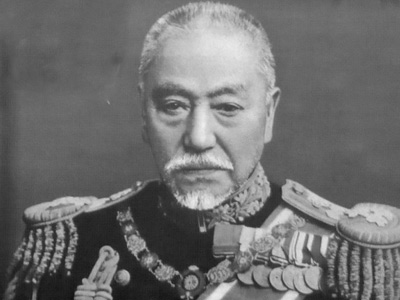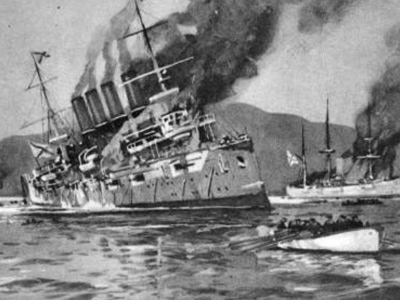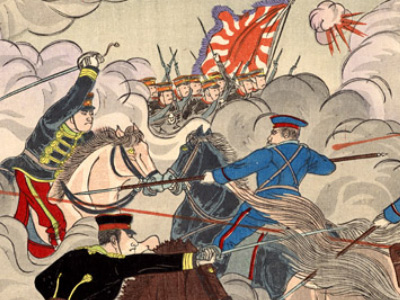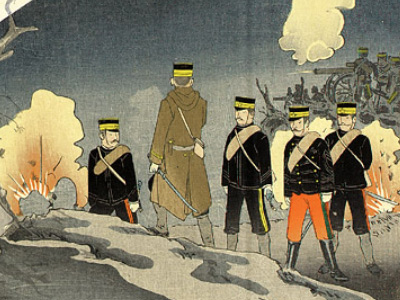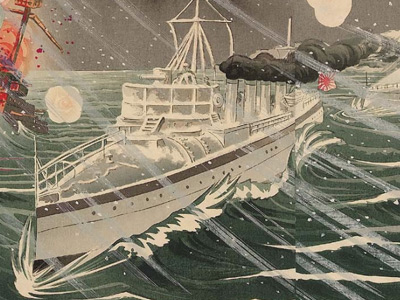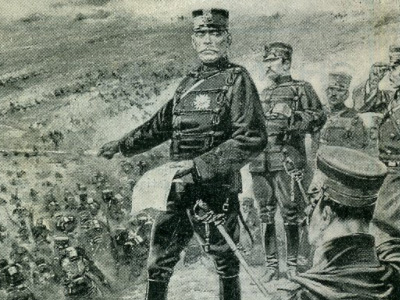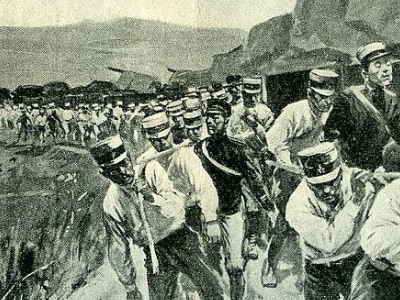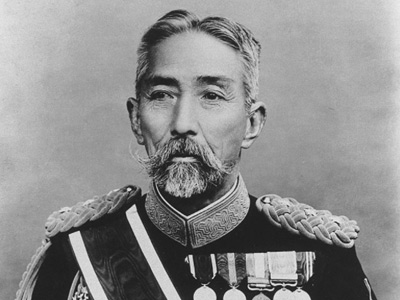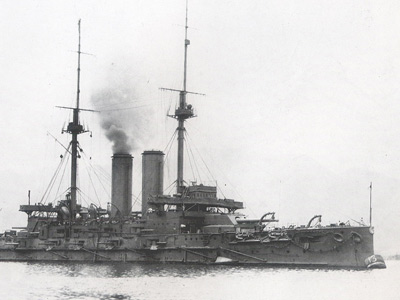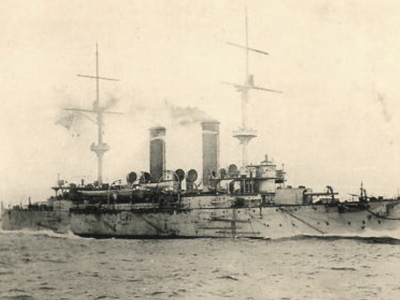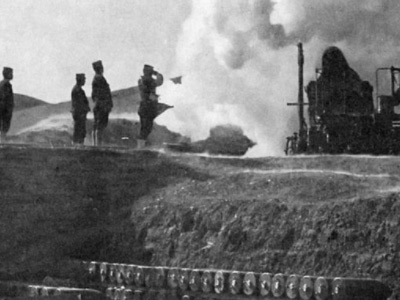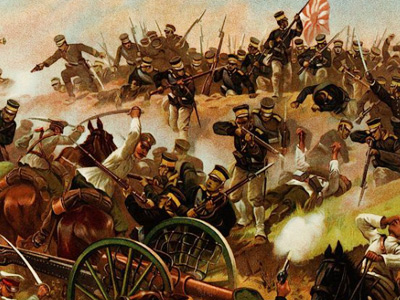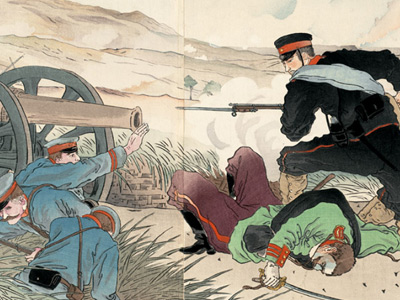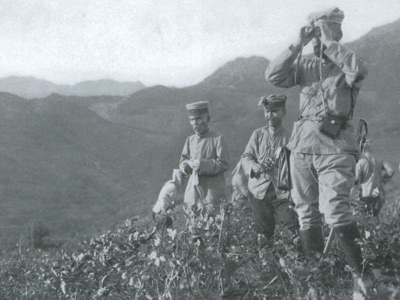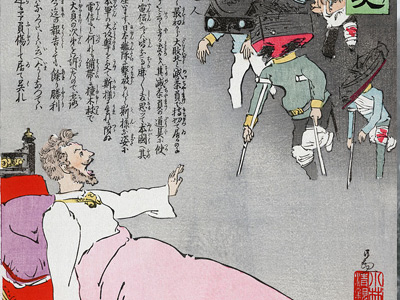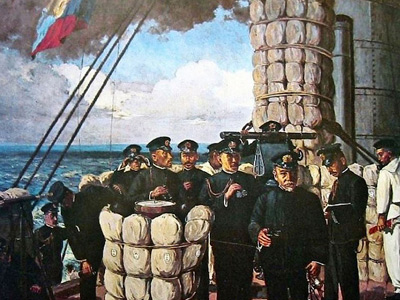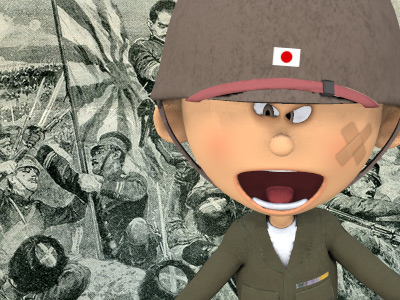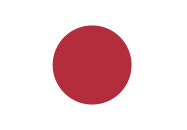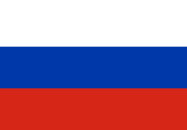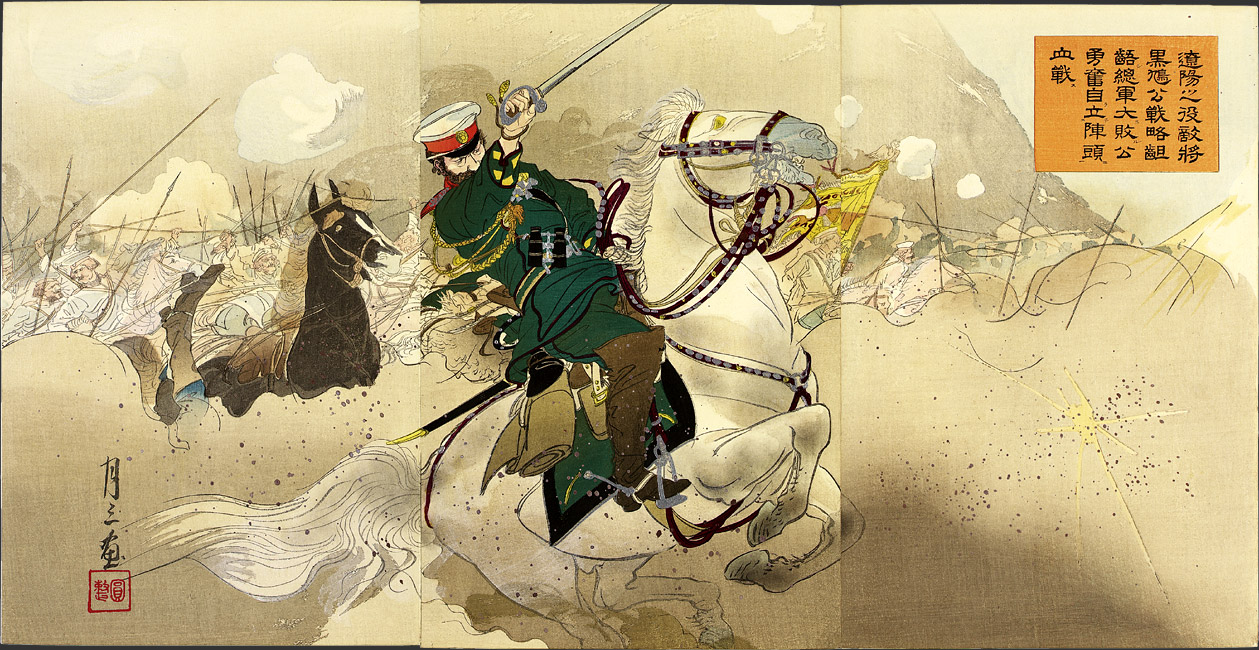Russo-Japanese War (1904–1905)
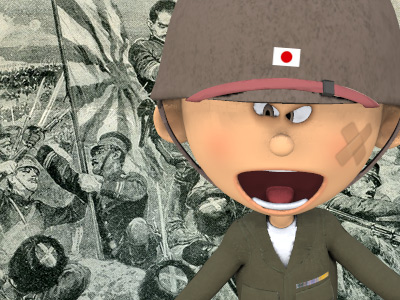
Pre-war Negotiations
The Japanese statesman Itō Hirobumi started to negotiate with the Russians. He regarded Japan as too weak to evict the Russian militarily, so he proposed giving Russia control over Manchuria in exchange for Japanese control of northern Korea. Meanwhile, Japan and Britain had signed the Anglo-Japanese Alliance in 1902, the British seeking to restrict naval competition by keeping the Russian Pacific seaports of Vladivostok and Port Arthur from their full use. The alliance with the British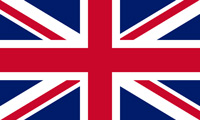 The United Kingdom of Great Britain and Ireland was a sovereign state in Northwestern Europe that comprised the entirety of the British Isles between 1801 and 1922. The United Kingdom, having financed the European coalition that defeated France during the Napoleonic Wars, developed a large Royal Navy that enabled the British Empire to become the foremost world power for the next century. meant, in part, that if any nation allied itself with Russia during any war against Japan
The United Kingdom of Great Britain and Ireland was a sovereign state in Northwestern Europe that comprised the entirety of the British Isles between 1801 and 1922. The United Kingdom, having financed the European coalition that defeated France during the Napoleonic Wars, developed a large Royal Navy that enabled the British Empire to become the foremost world power for the next century. meant, in part, that if any nation allied itself with Russia during any war against Japan The Empire of Japan, also known as the Japanese Empire or Imperial Japan, was a historical nation-state and great power that existed from the Meiji Restoration in 1868 until the enactment of the post-World War II 1947 constitution and subsequent formation of modern Japan. Economic and political turmoil in the 1920s led to the rise of militarism, nationalism and totalitarianism eventually culminating in Japan's membership in the Axis alliance. , then Britain would enter the war on Japan's side. Russia could no longer count on receiving help from either Germany
The Empire of Japan, also known as the Japanese Empire or Imperial Japan, was a historical nation-state and great power that existed from the Meiji Restoration in 1868 until the enactment of the post-World War II 1947 constitution and subsequent formation of modern Japan. Economic and political turmoil in the 1920s led to the rise of militarism, nationalism and totalitarianism eventually culminating in Japan's membership in the Axis alliance. , then Britain would enter the war on Japan's side. Russia could no longer count on receiving help from either Germany The German Empire, also referred to as Imperial Germany, the Second Reich, as well as simply Germany, was the period of the German Reich from the unification of Germany in 1871 until the November Revolution in 1918, when the German Reich changed its form of government from a monarchy to a republic. During its 47 years of existence, the German Empire became the industrial, technological, and scientific giant of Europe. or France
The German Empire, also referred to as Imperial Germany, the Second Reich, as well as simply Germany, was the period of the German Reich from the unification of Germany in 1871 until the November Revolution in 1918, when the German Reich changed its form of government from a monarchy to a republic. During its 47 years of existence, the German Empire became the industrial, technological, and scientific giant of Europe. or France French Third Republic was the system of government adopted in France from 4 September 1870, when the Second French Empire collapsed during the Franco-Prussian War, until 10 July 1940, after the Fall of France during World War II led to the formation of the Vichy government. During the 19th and 20th centuries, the French colonial empire was the second largest colonial empire in the world only behind the British Empire. without there being a danger of British involvement in the war. With such an alliance, Japan felt free to commence hostilities, if necessary.
French Third Republic was the system of government adopted in France from 4 September 1870, when the Second French Empire collapsed during the Franco-Prussian War, until 10 July 1940, after the Fall of France during World War II led to the formation of the Vichy government. During the 19th and 20th centuries, the French colonial empire was the second largest colonial empire in the world only behind the British Empire. without there being a danger of British involvement in the war. With such an alliance, Japan felt free to commence hostilities, if necessary.
The 1890s and 1900s marked the height of the "yellow peril" propaganda by the German government and the German Emperor Wilhelm II often wrote letters to his cousin Nicholas II of Russia Russian Empire was an empire and the final period of the Russian monarchy from 1721 to 1917, ruling across large parts of Eurasia. The rise of the Russian Empire coincided with the decline of neighbouring rival powers: the Swedish Empire, the Polish–Lithuanian Commonwealth, Qajar Iran, the Ottoman Empire, and Qing China. Russia remains the third-largest empire in history, surpassed only by the British Empire and the Mongol Empire., praising him as the "savior of the white race" and urging Russia forward in Asia. From November 1894 onward, Wilhelm had been writing letters praising Nicholas as Europe's defender from the "yellow peril", assuring the Tsar that God Himself had "chosen" Russia to defend Europe from the alleged Asian threat.
Russian Empire was an empire and the final period of the Russian monarchy from 1721 to 1917, ruling across large parts of Eurasia. The rise of the Russian Empire coincided with the decline of neighbouring rival powers: the Swedish Empire, the Polish–Lithuanian Commonwealth, Qajar Iran, the Ottoman Empire, and Qing China. Russia remains the third-largest empire in history, surpassed only by the British Empire and the Mongol Empire., praising him as the "savior of the white race" and urging Russia forward in Asia. From November 1894 onward, Wilhelm had been writing letters praising Nicholas as Europe's defender from the "yellow peril", assuring the Tsar that God Himself had "chosen" Russia to defend Europe from the alleged Asian threat.
On 1 November 1902, Wilhelm wrote to Nicholas that "certain symptoms in the East seem to show that Japan is becoming a rather restless customer" and "it is evident to every unbiased mind that Korea must and will be Russian". Wilhelm ended his letter with the warning that Japan and China would soon unite against Europe, writing: "Twenty to thirty million Chinese, supported by a half dozen Japanese divisions, led by competent, intrepid Japanese officers, full of hatred for Christianity-that is a vision of the future that cannot be contemplated without concern, and it is not impossible. On the contrary, it is the realisation of the yellow peril, which I described a few years ago and I was ridiculed by the majority of people for my graphic depiction of it...Your devoted friend and cousin, Willy, Admiral of the Atlantic". Wilhelm aggressively encouraged Russia's ambitions in Asia as France, Russia's ally since 1894, was less than supportive of Russian expansionism in Asia, and it was believed in Berlin that German support of Russia might break up the Franco-Russian alliance and lead to a new German-Russian alliance. The French, who been Russia's closest allies since 1894, made it clear that they disapproved of Nicholas's forward policy in Asia with the French Premier Maurice Rouvier publicly declaring that the Franco-Russian alliance applied only to Europe, not Asia, and that France would remain neutral if Japan attacked Russia. The American president Theodore Roosevelt, who was attempting to mediate the Russian-Japanese dispute, complained that Wilhelm's "yellow peril" propaganda, which strongly implied that Germany might go to war against Japan in support of Russia, encouraged Russian intransigence.
On 24 July 1905, in a letter to the British diplomat Cecil Spring-Rice, Roosevelt wrote that Wilhelm bore partial responsibility for the war as "he has done all he could to bring it about", charging that Wilhelm's constant warnings about the "yellow peril" had made the Russians uninterested in compromise as Nicholas believed that Germany would intervene if Japan attacked. The implicit promise of German support suggested by Wilhelm's "yellow peril" speeches and letters to Nicholas led many decision-makers in St. Petersburg to believe that Russia's military weaknesses in the Far East like the uncompleted Trans-Siberian railroad line did not matter as it was assumed the Reich would come to Russia's assistance of if war should come. In fact, neither Wilhelm nor his Chancellor Prince Bernhard von Bülow had much interest in East Asia, and Wilhelm's letters to Nicholas praising him as Europe's savior against the "yellow peril" were really meant to change the balance of power in Europe as Wilhelm believed that if Russia was embroiled with Japan, this would break up the Franco-Russian alliance and lead to Nicholas signing an alliance with Germany. This was especially the case as Germany had embarked upon the Tirpitz plan and a policy of Weltpolitik meant to challenge Britain's position as the world's leading power, and since Britain was allied to Japan, then if Russia and Japan could be manipulated into going to war with each other, that this in turn would lead to Russia turning towards Germany. Furthermore, Wilhelm believed if a Russian-German alliance emerged, France would be compelled to join it and having Russia pursue an expansionist policy in Asia would keep Russia out of the Balkans, thus removing the main source of tension between Russia and Germany's ally Austria-Hungary Austria-Hungary, often referred to as the Austro-Hungarian Empire, the Dual Monarchy, or Austria, was a constitutional monarchy and great power in Central Europe between 1867 and 1918. Austria-Hungary was one of the Central Powers in World War I, which began with an Austro-Hungarian war declaration on the Kingdom of Serbia on 28 July 1914.. During the war, Nicholas who took at face value Wilhelm's "yellow peril" speeches, placed much hope in German intervention on his side, and more than once, Nicholas chose to continue the war out of the belief that the Kaiser would come to his aid.
Austria-Hungary, often referred to as the Austro-Hungarian Empire, the Dual Monarchy, or Austria, was a constitutional monarchy and great power in Central Europe between 1867 and 1918. Austria-Hungary was one of the Central Powers in World War I, which began with an Austro-Hungarian war declaration on the Kingdom of Serbia on 28 July 1914.. During the war, Nicholas who took at face value Wilhelm's "yellow peril" speeches, placed much hope in German intervention on his side, and more than once, Nicholas chose to continue the war out of the belief that the Kaiser would come to his aid.
On 28 July 1903, Kurino Shinichiro, the Japanese minister in St. Petersburg was instructed to present his country's view opposing Russia's consolidation plans in Manchuria. On 12 August, the Japanese minister handed in the following document to serve as the basis for further negotiations:
- Mutual engagement to respect the independence and territorial integrity of the Chinese and Korean empires and to maintain the principle of equal opportunity for the commerce and industry of all nations in those countries.
- Reciprocal recognition of Japan's preponderating interests in Korea and Russia's special interests in railway enterprises in Manchuria, and of the right of Japan to take in Korea and of Russia to take in Manchuria such measures as may be necessary for the protection of their respective interests as above defined, subject, however, to the provisions of article I of this agreement.
- Reciprocal undertaking on the part of Russia and Japan not to impede development of those industrial and commercial activities respectively of Japan in Korea and of Russia in Manchuria, which are not inconsistent with the stipulations of article I of this agreement. Additional engagement on the part of Russia not to impede the eventual extension of the Korean railway into southern Manchuria so as to connect with the East China and Shan-hai-kwan-Newchwang lines.
- Reciprocal engagement that in case it is found necessary to send troops by Japan to Korea, or by Russia to Manchuria, for the purpose either of protecting the interests mentioned in article II of this agreement, or of suppressing insurrection or disorder calculated to create international complications, the troops so sent are in no case to exceed the actual number required and are to be forthwith recalled as soon as their missions are accomplished.
- Recognition on the part of Russia of the exclusive right of Japan to give advice and assistance in the interest of reform and good government in Korea, including necessary military assistance.
- This agreement to supplant all previous arrangements between Japan and Russia respecting Korea.
On 3 October, the Russian minister to Japan, Roman Rosen, presented to the Japanese government the Russian counterproposal as the basis of negotiations, as follows:
- Mutual engagement to respect the independence and territorial integrity of the Korean Empire.
- Recognition by Russia of Japan's preponderating interests in Korea and of the right of Japan to give advice and assistance to Korea tending to improve the civil administration of the empire without infringing the stipulations of article I.
- Engagement on the part of Russia not to impede the commercial and industrial undertakings of Japan in Korea, nor to oppose any measures taken for the purpose of protecting them so long as such measures do not infringe the stipulations of article I.
- Recognition of the right of Japan to send for the same purpose troops to Korea, with the knowledge of Russia, but their number not to exceed that actually required, and with the engagement on the part of Japan to recall such troops as soon as their mission is accomplished.
- Mutual engagement not to use any part of the territory of Korea for strategical purposes nor to undertake on the coasts of Korea any military works capable of menacing the freedom of navigation in the Straits of Korea.
- Mutual engagement to consider that part of the territory of Korea lying to the north of the 39th parallel as a neutral zone into which neither of the contracting parties shall introduce troops.
- Recognition by Japan of Manchuria and its littoral as in all respects outside her sphere of interest.
- This agreement to supplant all previous agreements between Russia and Japan respecting Korea.
In the Russian-Japanese negotiations then followed, although by early January 1904, the Japanese government had realised that Russia was not interested in settling the Manchurian or Korean issues. Instead, Russia's goal was buying time – via diplomacy – to further build up militarily.
In December 1903, Wilhelm wrote in a marginal note on a diplomatic dispatch about his role in inflaming Russo-Japanese relations: "Since 97-Kiaochow-we have never left Russia in any doubt that we would cover her back in Europe, in case she decided to pursue a bigger policy in the Far East that might lead to military complications (with the aim of relieving our eastern border from the fearful pressure and threat of the massive Russian army!). Whereupon, Russia took Port Arthur and trusting us, took her fleet out of the Baltic, thereby making herself vulnerable to us by sea. In Danzig 01 and Reval 02, the same assurance was given again, with result that entire Russian divisions from Poland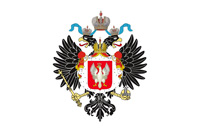 Congress Poland, Congress Kingdom of Poland, or Russian Poland, formally known as the Kingdom of Poland, was a polity created in 1815 by the Congress of Vienna as a semi-autonomous Polish state, a successor to Napoleon's Duchy of Warsaw. It was established when the French ceded a part of Polish territory to the Russian Empire following France's defeat in the Napoleonic Wars. In 1915, during World War I, it was replaced by the German-controlled nominal Regency Kingdom until Poland regained independence in 1918. and European Russia were and are being sent to the Far East. This would not had happened if our governments had not been in agreement!".
Congress Poland, Congress Kingdom of Poland, or Russian Poland, formally known as the Kingdom of Poland, was a polity created in 1815 by the Congress of Vienna as a semi-autonomous Polish state, a successor to Napoleon's Duchy of Warsaw. It was established when the French ceded a part of Polish territory to the Russian Empire following France's defeat in the Napoleonic Wars. In 1915, during World War I, it was replaced by the German-controlled nominal Regency Kingdom until Poland regained independence in 1918. and European Russia were and are being sent to the Far East. This would not had happened if our governments had not been in agreement!".
A recurring theme of Wilhelm's letters to Nicholas was that "Holy Russia" had been "chosen" by God to save the "entire white race" from the "yellow peril", and that Russia was "entitled" to annex all of Korea, Manchuria, and northern China up to Beijing. Wilhelm went on to assure Nicholas that once Russia had defeated Japan that this would be a deadly blow to British diplomacy, and the two emperors, the self-proclaimed "Admiral of the Atlantic" and the "Admiral of the Pacific" would rule Eurasia together, making them able to challenge British sea power as the resources of Eurasia would make their empires immune to a British blockade, which would thus allow Germany and Russia to "divide up the best" of the British colonies in Asia between them.
Nicholas had been prepared to compromise with Japan, but after receiving a letter from Wilhelm attacking him as a coward for his willingness to compromise with the Japanese (whom Wilhelm never ceasing reminding Nicholas represented the "Yellow Peril") for the sake of peace, become more obstinate. Wilhelm had wrote to Nicholas the question of Russian interests in Manchuria and Korea were besides the point, saying instead it was a matter of Russia "undertaking the protection and defense of the White Race, and with it, Christian civilization, against the Yellow Race. And whatever the Japs are determined to ensure the domination of the Yellow Race in East Asia, to put themselves at its head and organise and lead it into battle against the White Race. That is the kernel of the situation, and therefore there can be very little doubt about where the sympathies of all half-way intelligent Europeans should lie. England betrayed Europe's interests to America in a cowardly and shameful way over the Panama Canal question, so as to be left in 'peace' by the Yankees. Will the 'Tsar' likewise betray the interests of the White Race to the Yellow as to be 'left in peace' and not embarrass the Hague tribunal too much?". When Nicholas replied that he still wanted peace, Wilhelm wrote back in an telegram "You innocent angel!", telling his advisors "This is the language of an innocent angel. But not that of a White Tsar!". Nevertheless the belief in Tokyo was that Russia was not serious about seeking a peaceful solution to the dispute, on 13 January 1904, Japan proposed a formula by which Manchuria would be outside the Japanese sphere of influence and, reciprocally, Korea outside Russia's. By 4 February 1904, no formal reply had been received and on 6 February the Japanese minister to Russia, Kurino Shinichiro was recalled and Japan severed diplomatic relations with Russia.
Potential diplomatic resolution of territorial concerns between Japan and Russia failed; historians have argued that this directly resulted from the actions of Tsar Nicholas II. One crucial error of Nicholas was his mismanagement of government. Although certain scholars contend the situation arose from the determination of Tsar Nicholas II to use the war against Japan to spark a revival in Russian patriotism, no historical evidence supports this claim. The Tsar's advisors did not support the war, foreseeing problems in transporting troops and supplies from European Russia to the East. Convinced that his rule was divinely ordained and that he held responsibility to God, Nicholas II held the ideals of preserving the autocracy and defending the dignity, honor, and worth of Russia. This attitude by the Tsar led to repeated delays in negotiations with the Japanese government. The Japanese understanding of this can be seen from a telegram dated 1 December 1903 from Japanese minister of foreign affairs, Komura, to the minister to Russia, in which he stated:
"...the Japanese government have at all times during the progress of the negotiations made it a special point to give prompt answers to all propositions of the Russian government. The negotiations have now been pending for no less than four months, and they have not yet reached a stage where the final issue can with certainty be predicted. In these circumstances the Japanese government cannot but regard with grave concern the situation for which the delays in negotiations are largely responsible".
Errors by Nicholas II in managing the Russian government also led to his misinterpreting the type of situation in which Russia was to become involved with Japan. Some scholars have suggested that Tsar Nicholas II dragged Japan into war intentionally, in hopes of reviving Russian nationalism. This notion is disputed by a comment made by Nicholas to Kaiser Wilhelm of Germany, saying there would be no war because he "did not wish it". This does not reject the claim that Russia played an aggressive role in the East, which it did; rather, it means that Russia unwisely calculated that Japan would not go to war against its far larger and seemingly superior navy and army. Nicholas held the Japanese in contempt as "yellow monkeys", and he took for granted that the Japanese would simply yield in the face of Russia's superior power, which thus explains his unwillingness to compromise. Evidence of Russia's false sense of security and superiority to Japan is seen by Russian reference to Japan choosing war as a big mistake.
HISTORY
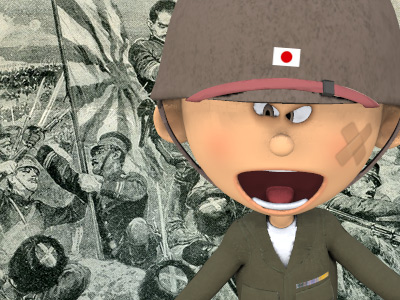
RESOURCES
This article uses material from the Wikipedia article "Russo-Japanese War", which is released under the Creative Commons Attribution-Share-Alike License 3.0.
© Stories Preschool. All Rights Reserved.
